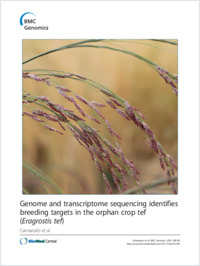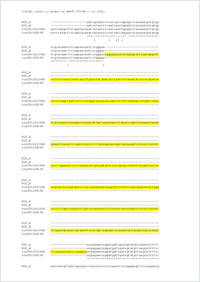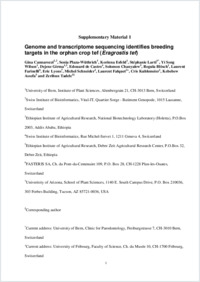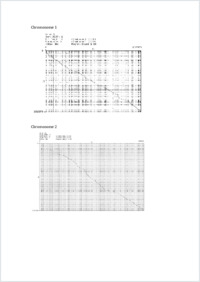Genome and transcriptome sequencing identifies breeding targets in the orphan crop tef (Eragrostis tef)
- Cannarozzi, Gina University of Bern, Institute of Plant Sciences, Switzerland - Swiss Institute of Bioinformatics, Vital-IT, Lausanne, Switzerland
- Plaza-Wüthrich, Sonia University of Bern, Institute of Plant Sciences, Switzerland
- Esfeld, Korinna University of Bern, Institute of Plant Sciences, Switzerland
- Larti, Stéphanie Current address: University of Bern, Clinic for Parodontology, Freiburgstrasse 7, Bern CH-3010, Switzerland
- Wilson, Yi Song University of Bern, Institute of Plant Sciences, Switzerland
- Girma, Dejene Ethiopian Institute of Agricultural Research, National Biotechnology Laboratory (Holetta, Addis Ababa, Ethiopia
- Castro, Edouard de Swiss Institute of Bioinformatics, Geneva, Switzerland
- Chanyalew, Solomon Ethiopian Institute of Agricultural Research, Debre Zeit Agricultural Research Center, Debre Zeit, Ethiopia
- Blösch, Regula University of Bern, Institute of Plant Sciences, Switzerland
- Farinelli, Laurent Fasteris SA, Plan-les-Ouates, Switzerland
- Lyons, Eric Univerisity of Arizona, School of Plant Sciences, 1140 E. South Campus Drive, 303 Forbes Building, P.O. Box 210036, Tucson, AZ 85721-0036, USA
- Schneider, Michel Swiss Institute of Bioinformatics, Geneva, Switzerland
- Falquet, Laurent Current address: University of Fribourg, Faculty of Science, Ch. du Musée 10, Fribourg CH-1700, Switzerland
- Kuhlemeier, Cris University of Bern, Institute of Plant Sciences, Switzerland
- Assefa, Kebebew Ethiopian Institute of Agricultural Research, Debre Zeit Agricultural Research Center, Debre Zeit, Ethiopia
- Tadele, Zerihun University of Bern, Institute of Plant Sciences, Switzerland
-
09.07.2014
Published in:
- BMC Genomics. - 2014, vol. 15, no. 1, p. 581
English
Background: Tef (Eragrostis tef), an indigenous cereal critical to food security in the Horn of Africa, is rich in minerals and protein, resistant to many biotic and abiotic stresses and safe for diabetics as well as sufferers of immune reactions to wheat gluten. We present the genome of tef, the first species in the grass subfamily Chloridoideae and the first allotetraploid assembled de novo. We sequenced the tef genome for marker-assisted breeding, to shed light on the molecular mechanisms conferring tef’s desirable nutritional and agronomic properties, and to make its genome publicly available as a community resource.Results: The draft genome contains 672 Mbp representing 87% of the genome size estimated from flow cytometry. We also sequenced two transcriptomes, one from a normalized RNA library and another from unnormalized RNASeq data. The normalized RNA library revealed around 38000 transcripts that were then annotated by the SwissProt group. The CoGe comparative genomics platform was used to compare the tef genome to other genomes, notably sorghum. Scaffolds comprising approximately half of the genome size were ordered by syntenic alignment to sorghum producing tef pseudo- chromosomes, which were sorted into A and B genomes as well as compared to the genetic map of tef. The draft genome was used to identify novel SSR markers, investigate target genes for abiotic stress resistance studies, and understand the evolution of the prolamin family of proteins that are responsible for the immune response to gluten.Conclusions: It is highly plausible that breeding targets previously identified in other cereal crops will also be valuable breeding targets in tef. The draft genome and transcriptome will be of great use for identifying these targets for genetic improvement of this orphan crop that is vital for feeding 50 million people in the Horn of Africa.
- Faculty
- Faculté des sciences et de médecine
- Department
- Département de Biologie
- Language
-
- English
- Classification
- Biological sciences
- License
-
License undefined
- Identifiers
-
- RERO DOC 211349
- DOI 10.1186/1471-2164-15-581
- Persistent URL
- https://folia.unifr.ch/unifr/documents/303736
Other files
Statistics
Document views: 250
File downloads:
- pdf: 242
- Alignment of tef KO2 A and B copies: 134
- Supplementary Notes, Supplementary Figures and Supplementary Tables and references.: 357
- Location of SSR markers in the tef genome: 102
- Alignment of A and B genomes: 189
- Location of tef CNLT markers in the pseudo-chromosomes of tef ordered by linkage group: 99
- Location of tef CNLT markers in the pseudo-chromosomes of tef ordered by linkage group: 92
- ist of selected SSRs identified from scaffolds: 99




